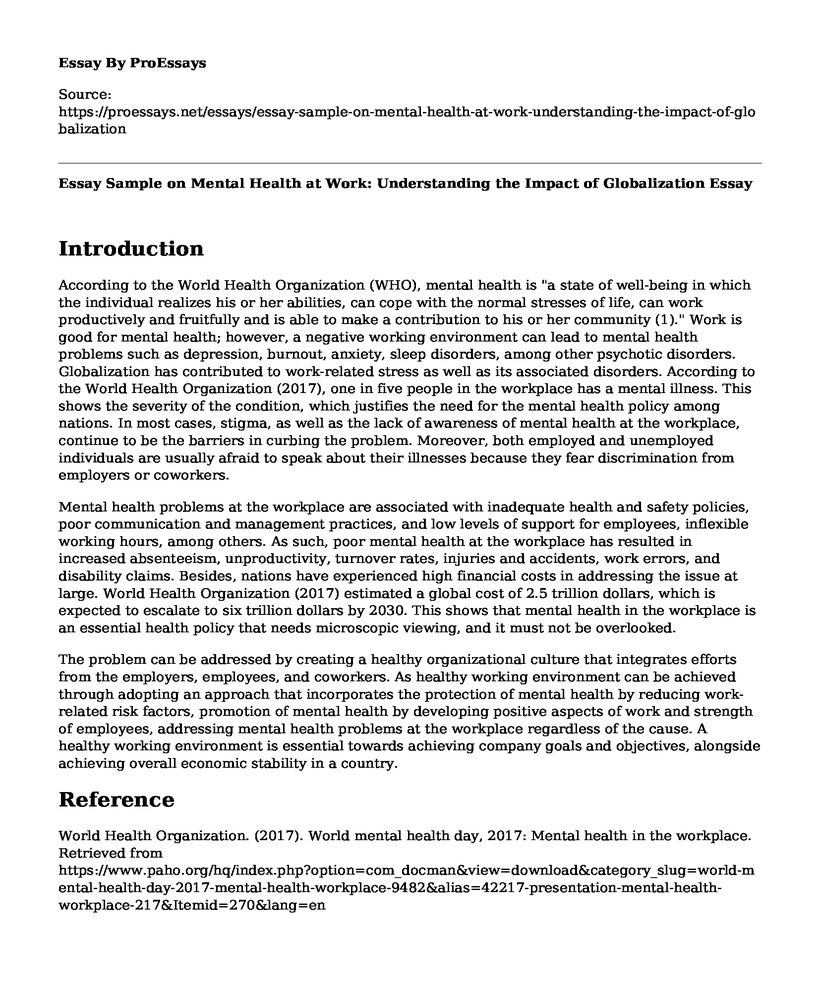Introduction
According to the World Health Organization (WHO), mental health is "a state of well-being in which the individual realizes his or her abilities, can cope with the normal stresses of life, can work productively and fruitfully and is able to make a contribution to his or her community (1)." Work is good for mental health; however, a negative working environment can lead to mental health problems such as depression, burnout, anxiety, sleep disorders, among other psychotic disorders. Globalization has contributed to work-related stress as well as its associated disorders. According to the World Health Organization (2017), one in five people in the workplace has a mental illness. This shows the severity of the condition, which justifies the need for the mental health policy among nations. In most cases, stigma, as well as the lack of awareness of mental health at the workplace, continue to be the barriers in curbing the problem. Moreover, both employed and unemployed individuals are usually afraid to speak about their illnesses because they fear discrimination from employers or coworkers.
Mental health problems at the workplace are associated with inadequate health and safety policies, poor communication and management practices, and low levels of support for employees, inflexible working hours, among others. As such, poor mental health at the workplace has resulted in increased absenteeism, unproductivity, turnover rates, injuries and accidents, work errors, and disability claims. Besides, nations have experienced high financial costs in addressing the issue at large. World Health Organization (2017) estimated a global cost of 2.5 trillion dollars, which is expected to escalate to six trillion dollars by 2030. This shows that mental health in the workplace is an essential health policy that needs microscopic viewing, and it must not be overlooked.
The problem can be addressed by creating a healthy organizational culture that integrates efforts from the employers, employees, and coworkers. As healthy working environment can be achieved through adopting an approach that incorporates the protection of mental health by reducing work-related risk factors, promotion of mental health by developing positive aspects of work and strength of employees, addressing mental health problems at the workplace regardless of the cause. A healthy working environment is essential towards achieving company goals and objectives, alongside achieving overall economic stability in a country.
Reference
World Health Organization. (2017). World mental health day, 2017: Mental health in the workplace. Retrieved from https://www.paho.org/hq/index.php?option=com_docman&view=download&category_slug=world-mental-health-day-2017-mental-health-workplace-9482&alias=42217-presentation-mental-health-workplace-217&Itemid=270&lang=en
Cite this page
Essay Sample on Mental Health at Work: Understanding the Impact of Globalization. (2023, Mar 29). Retrieved from https://proessays.net/essays/essay-sample-on-mental-health-at-work-understanding-the-impact-of-globalization
If you are the original author of this essay and no longer wish to have it published on the ProEssays website, please click below to request its removal:
- Reflection: Teacher Assistant
- Emotional Triggers Essay Example
- Essay Sample on Love Triangle Theory and Colors of Love Theory
- Paper Example on Sleep Apnea: A Serious Sleep Disorder Requiring Medical Attention
- Essay Example on Developing Employability Skills for Efficient Employee Performance
- Paper Example on Sensory Experience & Customer Loyalty: Analyzing Factors Correlating to Loyalty
- Conflict: Employer Responsibility to Foster Positive Work Environment







